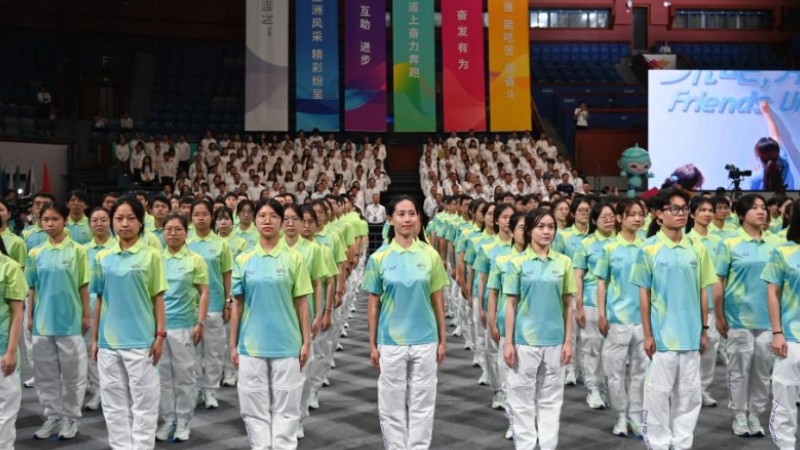BRICS gives voice to developing nations
Bloc seen as attempt by global majority to address obstacles in world affairs
The BRICS mechanism has amplified developing countries' voices on world affairs and brought great opportunities to them, global experts said.
Erik Solheim, the former executive director of the United Nations Environment Programme, said that BRICS may be the main institution for the multipolar world in the 21st century.
BRICS was established at a time when the United States dominated the world, when they waged some unilateral wars in Iraq and other places, and at the time when the West dominated totally in the United Nations, the World Bank, and other global institutions, he said.
"BRICS became the symbol of the new world where the main developing nations come together to have their voice on world affairs," he said.
Michael Dunford, emeritus professor of the University of Sussex and a visiting professor at the Institute of Geographical Sciences and Natural Resources Research at the Chinese Academy of Sciences, said that BRICS is just another step in an attempt by countries of the Global South and the Global East, or the global majority, to address obstacles to their economic and social development. It's also an attempt to increase trade and cooperation in a world which remains, in many respects, a neocolonial, center-periphery system.
"The Global South sought to develop institutions that complemented existing institutions, but also that address better their own needs," Dunford said, adding that BRICS also wants to enhance cooperation in all areas, including digital economy, green development, supply chain, and technology transfer.
Dunford said that BRICS is not seeking confrontation or hegemony. It is, instead, seeking a different kind of equitable world that does not need hegemony.
BRICS countries are willing to cooperate with all parties for sustainable development, and also probably, for indivisible security. It is quite clear that it is opposed to all attempts to engage in economic decoupling or disrupt supply chains.
Changes underway
Umer Karim, associate fellow at the King Faisal Center for Research and Islamic Studies in Riyadh, Saudi Arabia, said this year's BRICS summit is more significant because it was held against the backdrop of the Russia-Ukraine conflict.
There are countries, especially in the Western bloc, who are supporting Ukraine and they are against Russia, Karim said, adding there are countries in the Global South and they are from the eastern bloc or countries in the Middle East, and they have been reluctant to take sides.
"That's why BRICS, as a platform of countries that are not aligned with the broader Western political outlook or broader Western political order, has become much more important. And also it has become important as an economic hub," Karim said.
"I think this shows that the region understands that the global power changes are already underway and we are living in the multipolar world where power is no longer concentrated in the hands of a single hegemony and power has actually diversified," Karim said.
He said that many countries are seeing an opportunity in the engagement with the BRICS nations, particularly China, as a new actor that can contribute toward their economic and national security and also without any specific strings-attached policies, which usually has been the case when it comes to Western countries.
Swaran Singh, a professor of diplomacy and disarmament at Jawaharlal Nehru University in New Delhi, India, said that an important issue at the BRICS summit in Johannesburg was about de-dollarization.
Definitely, BRICS nations have been able to take initiatives to enhance the use of their local currencies in their bilateral trade. But as of now, no effort has been made to ensure the entire inter-BRICS trade happens in local currencies, Singh said.
More importantly, as they want to shift toward the use of local currencies, there are questions over credibility. The trust in some of the local currencies is not yet the same as the trust the world has in the dollar as of now.
So trust issues, and those in terms of volatility and convertibility of these local currencies to the dollar will remain a challenge, Singh said.
Photos
Related Stories
- Key facts of new BRICS members
- Interview: BRICS expansion to give Global South a louder voice -- South African expert
- Ethiopia's entry into BRICS mechanism to boost economic growth, political cooperation: experts
- Interview: Ethiopia's BRICS membership to elevate economy, regional ties: expert
- South African parliament hails success of 15th BRICS Summit
- Commentary: China-Africa cooperation ushers in better future following BRICS Summit
- Expanded BRICS seen as antidote to conflict
- BRICS expansion strengthens global diplomacy, reconciliation: veteran analyst
- BRICS based on openness to inclusive multilateralism: Pakistani foreign ministry
- BRICS shines brighter after historic expansion
Copyright © 2023 People's Daily Online. All Rights Reserved.









